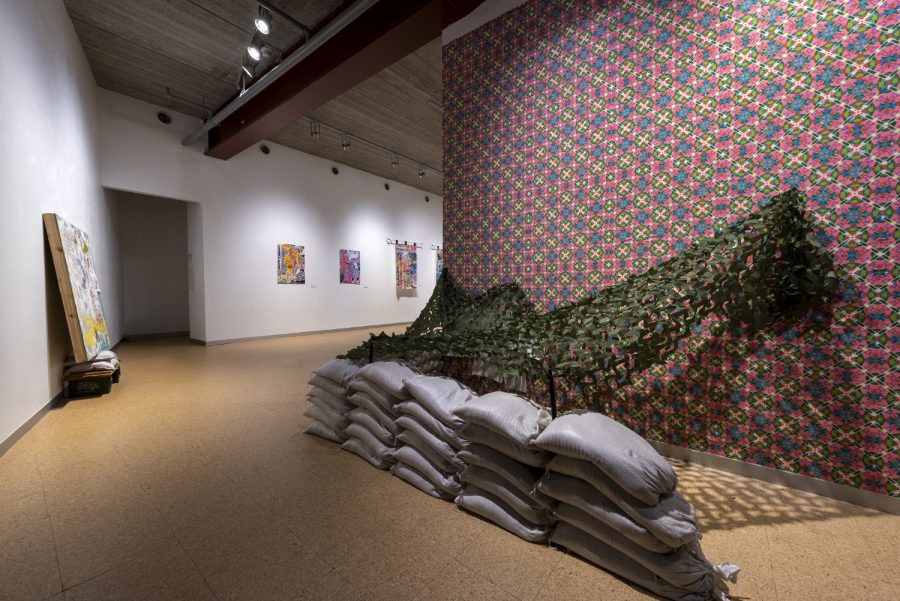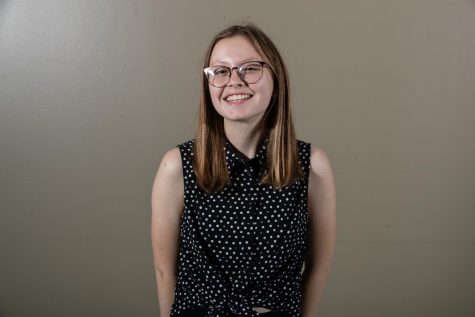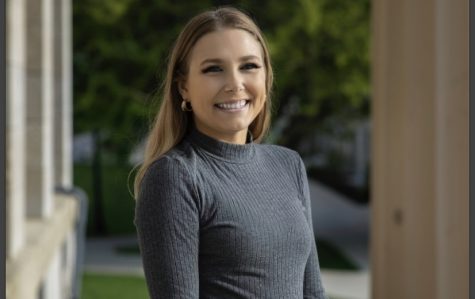UI M.F.A. art students find new ways to present theses amid COVID-19 closures
As COVID-19 has prompted the cancellation of M.F.A. art students’ thesis exhibitions, students have presented their theses in alternative ways such as through film, Instagram, or virtual galleries.
Jacob Lee’s installation “But This Wasn’t The War I Dreamed,” 3/12/2020, University of Iowa School of Art and Art History, Iowa City.
April 21, 2020
University of Iowa ceramics M.F.A. candidate Donté Hayes didn’t know when he agreed to participate in a documentary centered on his thesis project that it would become a placeholder for a canceled thesis exhibition.
Months before the novel coronavirus spread in Iowa and across the U.S., Hayes put on a show at the Iowa Ceramics Center in January in Cedar Rapids, where he was approached by UI alum Alan Murdock. The filmographer asked if he could make a documentary about Hayes and his upcoming thesis project, and Hayes agreed.
“We had no idea that coronavirus was going to stop everything,” Hayes said. “It was a great opportunity just to show how I was preparing for my thesis show and things. And the video documentary ended up being the stand-in in a lot of ways, because today [April 10] was going to be my thesis show reception. If it wasn’t for Alan, no one would have saw any of it, or even thought of what I was trying to do.”
Hayes is one of many graduating M.F.A. art students forced to cancel or indefinitely postpone their thesis shows after the Visual Arts Building, along with the rest of the UI, closed because of the COVID-19 pandemic. While the UI waived thesis exhibitions as a graduation requirement for graduate students, many still turned to alternative ways to present three years of dedicated work.
Hayes’ said he hopes his thesis show will be presented in the summer. His thesis’ concept takes place in a future even more unknown than the present day: the year of 3021. It’s now featured in Murdock Media Production’s documentary, titled “Welcome to Afro City: Part 1.”
Hayes’ thesis would have consisted of several ceramic pieces and prints. In his thesis’ concept, humanity has been forced to live underground for generations to avoid an uninhabitable surface. Fifty years before 3021, people resurfaced, some starting a city in Iowa named “Afro City” where people could be one again.
Because of the COVID-19 pandemic, Hayes has had to change some core themes of his thesis.
“It’s kind of interesting, because I’m changing my thesis to speak about, how is it welcoming when we have to be six feet apart from each other?” he said.
RELATED: The UI School of Art and Art History’s Intermedia Open House defies any singular definition
Because Hayes and other artists were told to leave the Visual Arts Building, he also wasn’t able to fire any of his artwork for his show.
“Even if I was allowed to do a show … I still wouldn’t be able to do it because I would have to get all the work fired first,” Hayes said.
Artists of other disciplines have also experienced the disruptions caused by COVID-19, including photography M.F.A. candidate Neva Nobles-Alder, who was scheduled to present her thesis the same week as Hayes. Nobles-Alder creates landscape models and photographs insects from her insect specimen collection in those models.
At her show, the artist would have had 22 images with golden frames around them, with her model sculptures hanging from the walls, and some featured throughout the floorspace.
Like Hayes, some of Nobles-Alder’s work was left unfinished because of COVID-19.
“The images have been made, but they have not been printed,” she said. “The landscape models are all made, but some of them I still had to make the bases for where they would have sat on for the walls.”
Through the Photo Department, Nobles-Alder was still able to show her work on its Instagram, @uiowaphoto.
Printmaking M.F.A. student Jake Lee’s show, “But This Wasn’t The War I Dreamed,” was the last to be put on before the Visual Arts Building closed. Lee, a U.S. Army veteran, had to take down his exhibition early, missing out on his show’s closing reception, which happens on Fridays.
“It’s a good opportunity to just hang out with your friends, have people see your work, and there’s people in the community outside of the university that come to see the work,” Lee said.
Receptions also provide opportunities for artists to sell work and get documentation of people visiting the exhibit — an important factor for artists when it comes to applying for jobs and residencies in the professional realm, he said. While Lee did not view the gallery as a way to make money by selling his work, he said he did miss the opportunity to formally commemorate his work with friends and family and have more people outside the UI see his prints.
Lee has also been able to show his work in virtual galleries offered online. While Lee said most of his peers already have websites to show their work, showing work in a virtual gallery can serve as an alternative to show to a wider audience, and allow for artists to gain documentation of a physical show.
Mortar and Pestle, a virtual gallery startup in Lee’s hometown of Lexington, Kentucky, has extended its first open call specifically to provide a place for B.F.A. and M.F.A. graduating students to show their canceled or indefinitely postponed thesis shows free of charge. Lee is also set to show at an online gallery based in Cedar Rapids, OnViewGallery.
The UI Art and Art History Department does not currently offer a virtual gallery for graduate students to put on their thesis shows. While Lee and others have turned to virtual galleries offered elsewhere, many of those galleries require consultations beforehand, and charge fees.
The Daily Iowan reached out to the School of Art and Art History for comment on whether or not the department plans to offer a virtual gallery option for M.F.A. students, but did not receive a response.
“It’s a little heartbreaking to get to the end of your M.F.A. programs in three years and then not being able to put on the final event — you know, the culmination of all your experiences and research,” Nobles-Adler said.
















